The dwindling of juan cun (眷村), or military dependents’ villages, has recently become an inspiration for many artistic endeavors.
Television producer Wang Wei-chung’s (王偉忠) successful television drama The Story of Time (光陰的故事) and sold-out theatrical production The Village (寶島一村) are two examples that immediately come to mind.
Now the disappearing culture of veterans’ communities has been translated onto the silver screen by local filmmakers eyeing both the past and present. Seasoned director Lee You-ning’s (李祐寧) Four Hands (麵引子), which hit local cinemas earlier this month, is an historical melodrama that deals with a Chinese Nationalist army veteran who goes back to China to visit what’s left of his family. Mostly set in the atmospheric Treasure Hill Artist Village (寶藏巖國際藝術村), the film is nevertheless a lachrymose disappointment starring Wu Hsing-kuo (吳興國), who delivers an embarrassingly exaggerated performance.
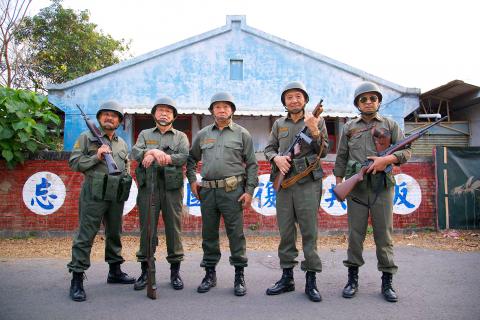
Photo Courtesy of Applause Entertainment
On a completely different note, War Game 229 (燃燒吧!歐吉桑), the feature debut by photographer and documentary filmmaker Huang Chien-liang (黃建亮), is a fast-paced movie whose action centers on airsoft games.
The main players in the film are five veterans who fled from China to Taiwan with Chinese Nationalist Party (KMT) troops in the late 1940s. After decades in a military residential compound, the aged veterans are the last holdouts and find themselves facing eviction. Meanwhile, members of a champion airsoft team find out about the place and make what they think is an abandoned village into a practice field.
Piqued by the intrusion, the five experienced soldiers decide to fight back and defend their home turf.
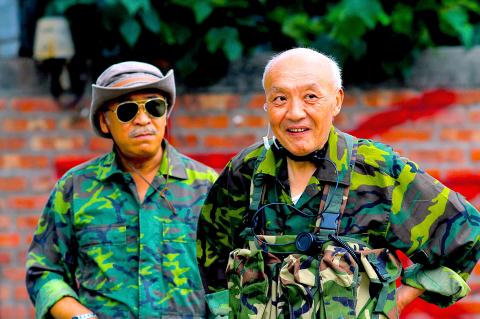
Photo Courtesy of Applause Entertainment
Attired in genre trappings, the film revolves around the motif of home. To the veterans who retreated to Taiwan and now face a second relocation, home is never something taken for granted. The 20-somethings play combat games, but the former soldiers know too well that to lose a battle can mean losing your home.
Greatly supported by a fine cast of veteran actors who rarely make appearances in today’s television programs and movies, War Game 229 shows promise as an excellent work of entertainment. It gives the memory of the past a creative, new reading, showing that the heavy subject of history can also be approached with humor, action and excitement. Unfortunately, mediocre production values prevent the work from rising beyond the quality of television drama. War Game 229 has plenty of bright ideas, but its director chose to rush the story rather than allow space for the ideas to evolve.
A final blow comes in the form of feeble performances by young pop idols, including models-turned-actors Tender Huang (黃騰浩) and Jenna Wang (王思平).
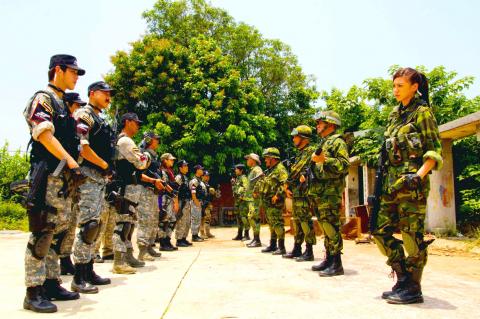
Photo Courtesy of Applause Entertainment
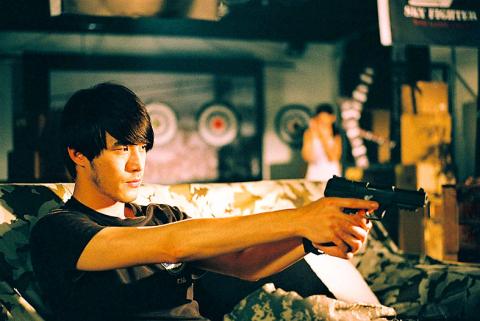
Photo Courtesy of Applause Entertainment
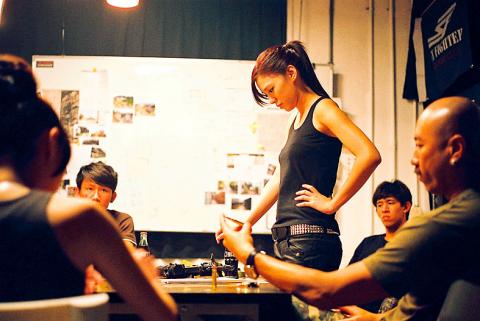
Photo Courtesy of Applause Entertainment

Google unveiled an artificial intelligence tool Wednesday that its scientists said would help unravel the mysteries of the human genome — and could one day lead to new treatments for diseases. The deep learning model AlphaGenome was hailed by outside researchers as a “breakthrough” that would let scientists study and even simulate the roots of difficult-to-treat genetic diseases. While the first complete map of the human genome in 2003 “gave us the book of life, reading it remained a challenge,” Pushmeet Kohli, vice president of research at Google DeepMind, told journalists. “We have the text,” he said, which is a sequence of

On a harsh winter afternoon last month, 2,000 protesters marched and chanted slogans such as “CCP out” and “Korea for Koreans” in Seoul’s popular Gangnam District. Participants — mostly students — wore caps printed with the Chinese characters for “exterminate communism” (滅共) and held banners reading “Heaven will destroy the Chinese Communist Party” (天滅中共). During the march, Park Jun-young, the leader of the protest organizer “Free University,” a conservative youth movement, who was on a hunger strike, collapsed after delivering a speech in sub-zero temperatures and was later hospitalized. Several protesters shaved their heads at the end of the demonstration. A

Every now and then, even hardcore hikers like to sleep in, leave the heavy gear at home and just enjoy a relaxed half-day stroll in the mountains: no cold, no steep uphills, no pressure to walk a certain distance in a day. In the winter, the mild climate and lower elevations of the forests in Taiwan’s far south offer a number of easy escapes like this. A prime example is the river above Mudan Reservoir (牡丹水庫): with shallow water, gentle current, abundant wildlife and a complete lack of tourists, this walk is accessible to nearly everyone but still feels quite remote.

In August of 1949 American journalist Darrell Berrigan toured occupied Formosa and on Aug. 13 published “Should We Grab Formosa?” in the Saturday Evening Post. Berrigan, cataloguing the numerous horrors of corruption and looting the occupying Republic of China (ROC) was inflicting on the locals, advocated outright annexation of Taiwan by the US. He contended the islanders would welcome that. Berrigan also observed that the islanders were planning another revolt, and wrote of their “island nationalism.” The US position on Taiwan was well known there, and islanders, he said, had told him of US official statements that Taiwan had not